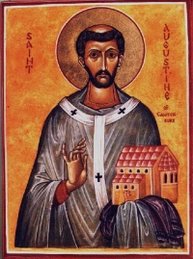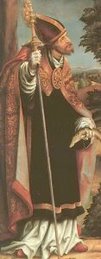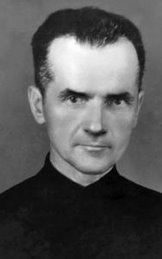
Book Review: A Man For All Seasons, by Robert Bolt
Legend has it that when the late Bo Schembechler coached football at the University of Michigan, he would have the team watch the movie “Patton” before the Michigan-Ohio State Game. General George Patton, played by George C. Scott, apparently inspired the team to defeat Ohio State. Then Michigan would go out to the Rose Bowl and play on New Years Day.
Inevitably, Michigan would get squashed like a bug by some West Coast team.
Still, the movie is stirring….
In a similar way, I always think of Fred Zinnemann’s movie A Man For All Seasons as a spiritual version of Patton. For a Catholic looking for some inspiration to follow Our Lord and not the world, the story of St. Thomas More’s battle of wills with King Henry VIII is worth watching. St. Thomas More exemplifies Our Lord’s words that we need to be “as wise as serpents, and as gentle as doves.”(Matt. 10:6) as he works his way around the various legal traps set for him.
This is rather odd when you consider that Robert Bolt, who wrote the original play, was an agnostic. He was more interested in St. Thomas More as an example of one man standing alone against the crowd. Bolt used this theme in several plays he wrote. This idea or concept is summed up in this dialogue with the Duke of Norfolk from the play:
"What matters is not that it's true, but that I believe it; or no, not that I believe it, but that I believe it."
St. Thomas More’s faith was not as important; for all we know, Bolt may have been writing about a late-term abortionist.
I bought a copy of the play because there were several quotes in the movie that really stood out as worth remembering. One of my favorites is More’s discussion with Richard Rich. Rich wants a position at Court, and More advises against it. He recommends that he take a teaching position. Let’s listen in:
More: “…Why not be a teacher? You’d be a fine teacher. Perhaps, a great one.”
Rich: “And if I was who would know it?”
More: “You, your pupils, your friends, God. Not a bad public, that….”
Another great quote from the play is when St. Thomas More hears of an Oath, a Bill which he may have to swear to. More reminds his daughter Meg and her husband Will Roper that he may be able to take the oath. He speaks of Man’s purpose:
“God made the angels to show him splendor – as he made the animals
for innocence and plants for their simplicity. But Man he made to serve
him wittily, in the tangle of his mind! If he suffers us to fall to such a case
that there is no escaping, then we may stand to our tackle as best we can,
and yes, Will, then we may clamour like champions…if we have the spittle
for it. And no doubt it delights God to see splendour where he only looked
for complexity. But it’s God’s part, not our own, to bring ourselves to that
extremity! Our natural business lies in escaping….”
I have recalled this quote many times, especially when I don’t know what to do for my family and it looks as if there is no way out of our predicament. Something always comes up – either my wife or I figure something out, or else God provides.
Even better than Bolt's play are some quotes from the man himself, like this prayer:
Give Me Thy Grace, good Lord, to set the world at naught, to set my mind fast upon Thee,
and not to hang upon the blast of men's mouths.
To be content to be solitary.
Not to long for worldly company.
Little and little utterly to cast off the world, and rid my mind of all the business thereof.
Not to long to hear of any worldly things, but that the hearing of worldly fantasies may
be to me displeasing.
Gladly to be thinking of God.
Piteously to call for His help.
To lean unto the comfort of God.
Busily to labor to love Him.
To know my own vility and wretchedness.
To humble and meeken myself under the mighty hand of God.
To bewail my sins passed.
For the purging of them, patiently to suffer adversity.
Gladly to bear my purgatory here.
To be joyful of tribulations.
To walk the narrow way that leadeth to life.
To bear the cross with Christ.
To have the last thing in remembrance.
To have ever afore mine eye my death that is ever at hand.
To make death no stranger to me.
To foresee and consider the everlasting fire of hell.
To pray for pardon before the judge to come.
To have continually in mind the Passion that Christ suffered for me.
For His benefits incessantly to give Him thanks.
To buy the time again that I before have lost.
To abstain from the vain confabulations.
To eschew light, foolish mirth and gladness.
Recreations not necessary to cut off.
Of worldly substance, friends, liberty, life, and all, to set the loss at right naught
for the winning of Christ.
To think my worst enemies my best friends.
For the brethren of Joseph could never have done him so much good with their
love and favor as they did him with their malice and hatred.
These minds are more to be desired of every man, than all the treasures
of all the princes and kings, Christian and heathen, were it gathered and
laid together all upon one heap.
St. Thomas More
I recommend the play and (gasp!) the movie without reservation, but realize that the far better thing would be to read St. Thomas More's own writings.
I am rather upset that my picture was used for the cover of the book above. I thought those were 'practice' shots.





















2 comments:
have got the DVD..will watch it now!
Want to know more about St. Thomas More? The King's Good Servant But God's First by James Monti is an excellent read. The book's subtitle is accurate: The Life and Writings of St. Thomas More. It also makes for good spiritual reading.
... ¶
Probably most folks know that St. Thomas More is the patron saint of lawyers because he himself was a lawyer. What may be less well known is that his life is a very good example of living a holy life within the world. He spent a few years as a novice Carthusian and he developed habits of prayer and fasting that served him well for the trails of his public life. Accordingly, he is quite popular with folks in Opus Dei.
... ¶
St. Thomas More should also be known as the patron saint of the working man and woman.
Post a Comment